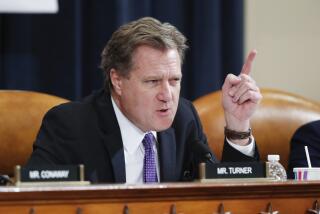U.S. Urged to Take Action on Iraq’s Weapons Facilities : Military: Key congressman says the Bush Administration should use force, if necessary, to knock out suspected nuclear sites.
- Share via
WASHINGTON — Warning that Iraq is still hiding some of its nuclear capabilities from U.N. inspectors, House Armed Services Committee Chairman Les Aspin (D-Wis.) urged the Bush Administration Friday to resume combat air patrols over Baghdad and to use force, if necessary, to destroy all remaining Iraqi weapons facilities.
“The White House is playing a game of threat and forget. . . . Since the war ended, we’ve had bellicose language out of Washington but no action,” Aspin said in a committee report on Iraq.
The report, which also called on the Administration to do more to help Iraq’s Kurdish minority, was released as U.N. officials announced that inspection teams discovered more chemical-weapons production equipment hidden in an Iraqi sugar factory--evidence of what Aspin said is a continuing effort by Iraq to retain its unconventional weapons and develop more of them in violation of cease-fire terms imposed on it after the Persian Gulf War.
It also came on the heels of a similarly sober assessment by CIA Director Robert M. Gates, who told lawmakers Tuesday that short-range missiles with chemical warheads are expected to proliferate throughout North Africa and southern Asia over the next decade.
Gates, in the unclassified part of his testimony before Aspin’s committee, did not identify the countries that the CIA considers likely to possess unconventional weapons by the beginning of the next century. But both Iran and Iraq are known to have nuclear programs under way. Israel is now the only nation in the Middle East known to possess nuclear weapons--a fact that Iran has cited as its justification for seeking to acquire them.
Citing the growing proliferation threat, Aspin said the manner in which the United States deals with Iraqi President Saddam Hussein will set an important precedent that is certain to have “a big impact on the rules of the game” in the new post-Cold War order emerging in the wake of the collapse of the Soviet Union.
“There are things this Administration could be doing that it isn’t,” Aspin said. “We won the war, but we will lose the peace if Saddam or his successors get nuclear weapons.”
Aspin proposed a three-part plan to improve humanitarian relief efforts for starving Iraqis, increase inspections of suspected weapons sites and impose “Draconian” penalties if Iraq continues to defy U.N. cease-fire terms.
“We’ve got to deny Saddam the ability to use his own suffering population as hostages and demonstrate (that) we mean business when it comes to putting him out of the nuclear business,” Aspin said in a speech, prepared for delivery in New York, that accompanied the report. Specifically, Aspin said the Administration should:
* Flood Iraq with more nuclear inspectors, providing them with armed air and land escorts and, if necessary, taking over an Iraqi air base to use as a headquarters for inspection efforts.
* Deploy more combat aircraft to the area, resume combat air patrols over Baghdad and draw up a list of targets to be attacked by new air strikes if Hussein “continues to lie, cheat and obstruct inspection efforts.” Such targets, he said, could include facilities to which the U.N. inspectors have been denied access, as well as military and government installations of “high value to the military . . . and/or to the leadership.”
* Wrest the “food weapon” from Hussein by forcing him to allow the United Nations to distribute humanitarian supplies directly to needy Iraqis. The effort could be financed by charging the costs against future Iraqi oil earnings or by seizing some of the $3 billion to $5 billion in frozen Iraqi assets.
Aspin put forward his proposal at a time of continuing debate within the Administration over whether it should mount new efforts to force Hussein from power.
At a top-level White House meeting Thursday, representatives of the Joint Chiefs of Staff presented a package of new military options that might be used by the United States in support of an Iraqi military coup, sources said. But they said no decision was made.
Times staff writer Douglas Jehl contributed to this report.
More to Read
Sign up for Essential California
The most important California stories and recommendations in your inbox every morning.
You may occasionally receive promotional content from the Los Angeles Times.









